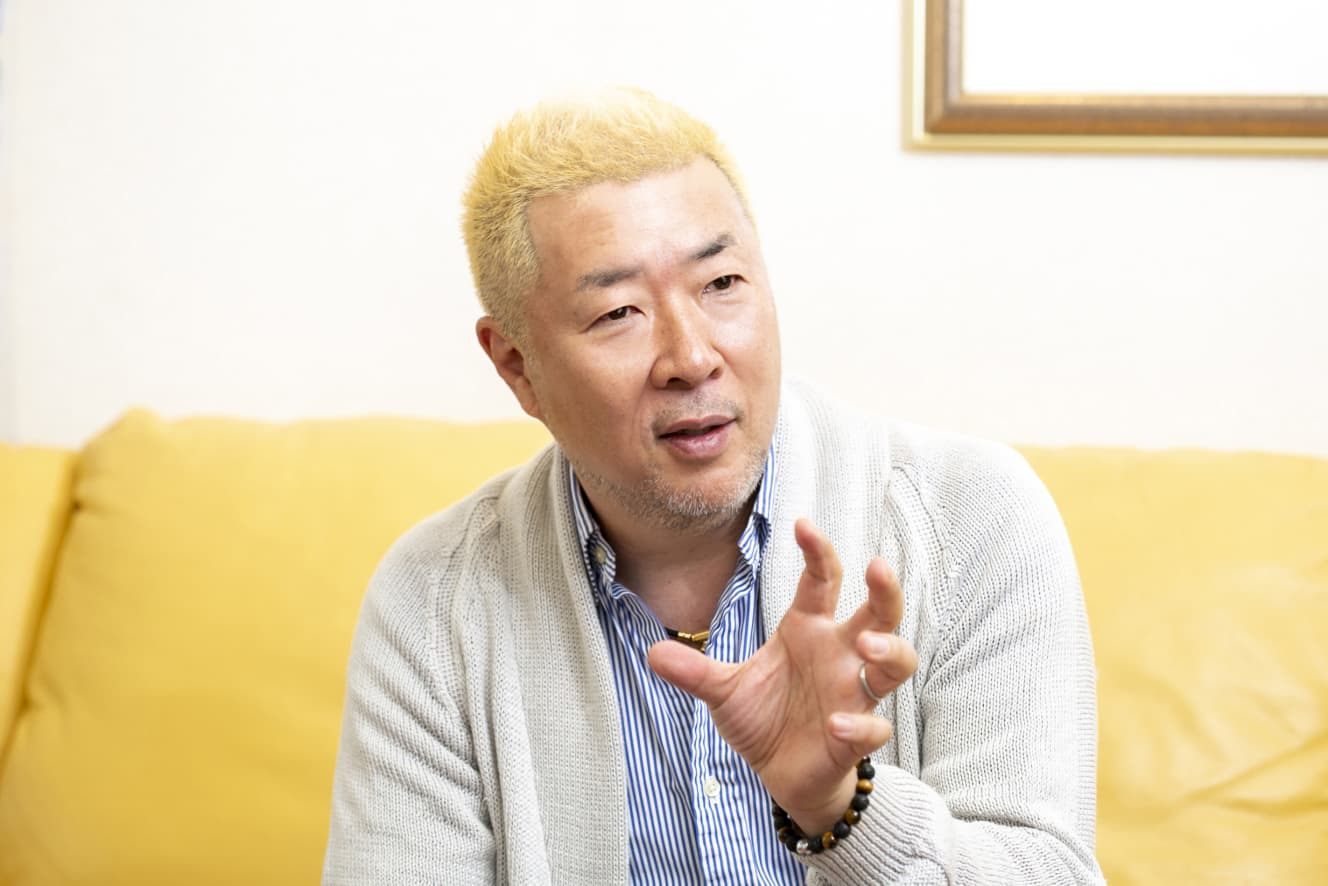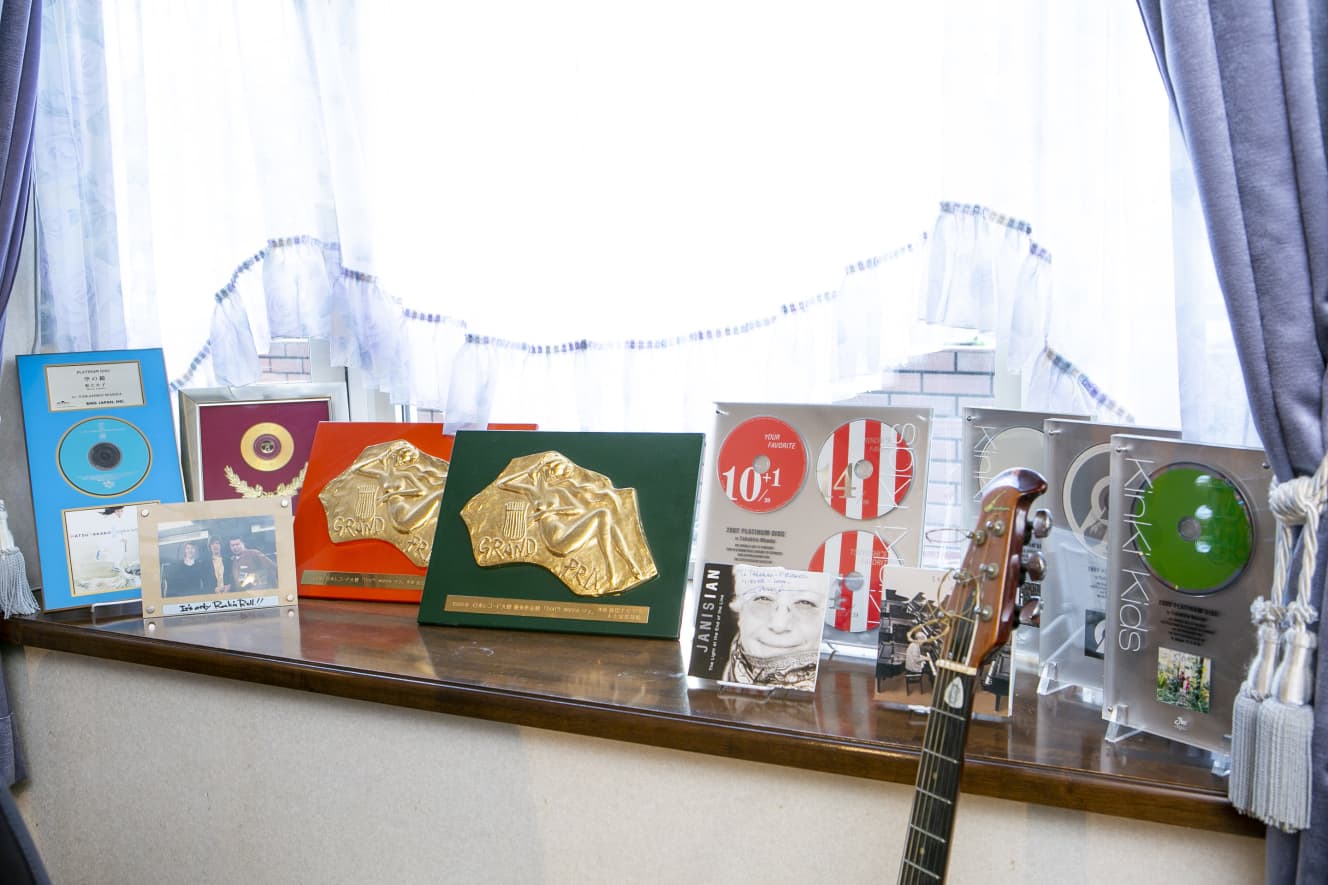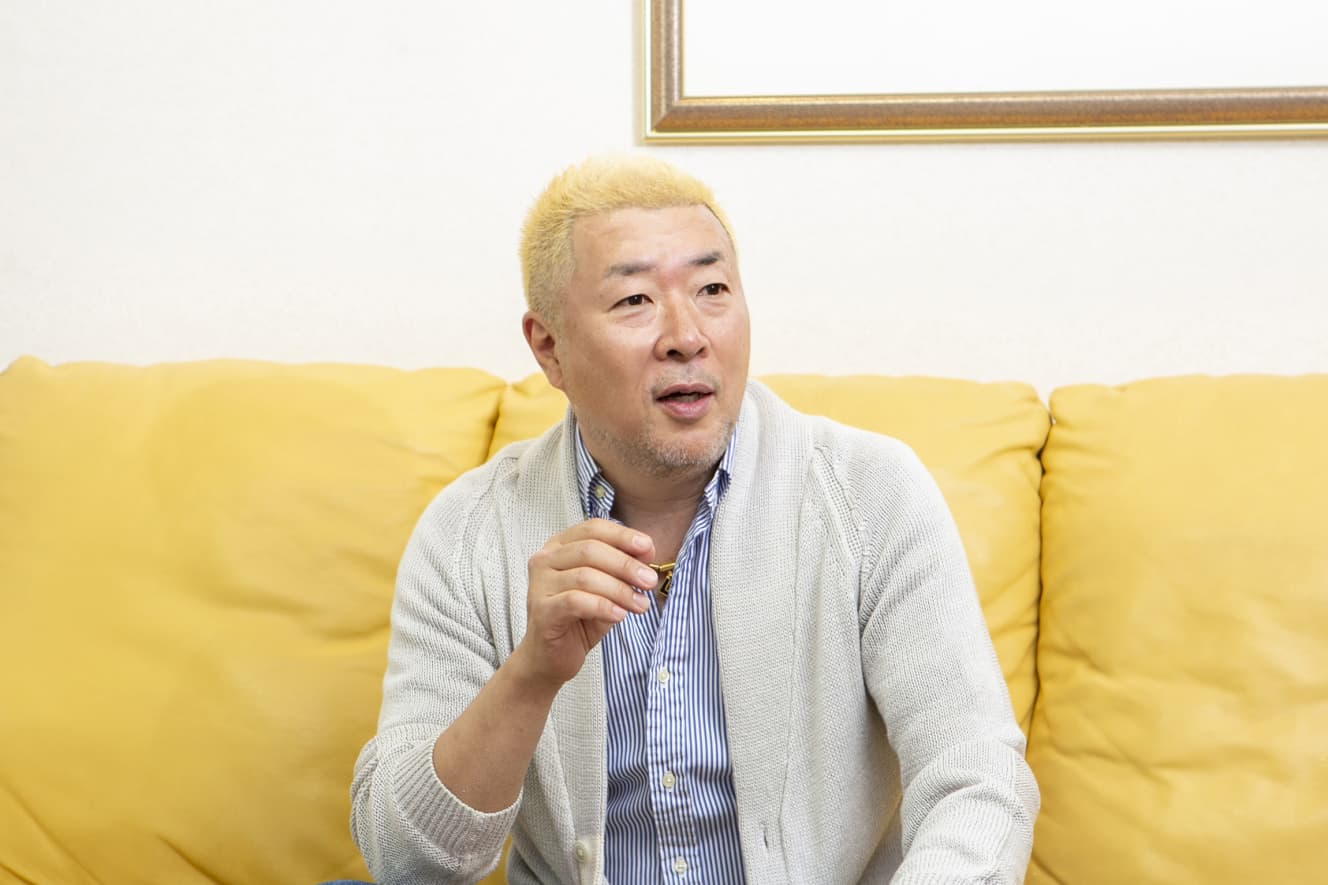Lyricist Takahiro Maeda talks about the secrets of lyric writing taught by Tetsuya Komuro
Secret Story with Tetsuya Komuro and his thoughts on lyrics

He has written lyrics for many artists, including Rina Chinen, Takataka Matsu, KinKids, and Claw Z. “If someone commits suicide after hearing my lyrics, and the bereaved family complains, ‘What are you going to do about it? I have decided that I will only write lyrics that I can say, ‘I’m sorry for the person who died, but those lyrics were good.
I only write lyrics for which I can take responsibility no matter what. I never write lyrics that I regret.
As anyone who has worked as a so-called “creator” will understand, words like these are not common words. That is how righteous lyricist Takahiro Maeda is.
I, who work in the field of visual arts and have nothing to do with the world of music, have known Mr. Maeda for almost 10 years through a small chance encounter, and I call him “Aniki,” meaning “my big brother.
I was so moved by the lyrics of “DNA Rhapsody” by Momoiro Clover Z, which Maeda-san wrote, that I once used it as the theme song for a TV show I was producing. Because of the lyrics of the song, Maeda’s lyrics are known as “Momoiro without Laughing,” and the song continues to be a hot favorite among Momoiro’s ardent fans, known as “Mononofs.
Aniki’s music has produced a number of brilliant hits, including “Don’t wanna cry” by Namie Amuro, which he co-wrote with Tetsuya Komuro and won the 38th Japan Record Award, and “Chase the Chance” by Namie Amuro, who also co-wrote with Komuro As the lyrics of “Chase the Chance” indicate, his career as a writer has been one of “living the path he believes in straight” to a surprising degree.
And now, for the sake of his younger music writers, he is going straight ahead with one activity.

I asked Etsuko Raiu, “Can you hold out until you are 30 years old?” I asked her.
Aniki’s life as a music writer began when he was a senior in high school. It all started when he happened to look in the phone book. Nowadays, I would say, “Are you a stalker? I was looking through the phone book, and I happened to see a phone number there.
I was looking in the phone book and happened to find the name “Etsuko Raiu. It was right around the time when ‘Sailor Suit and Machine Gun’ was popular. I thought, “Could it be,” so I called and a woman answered.
I asked, “Um, is this the home of lyricist Etsuko Raiu? She answered, “Yes, that’s right. It was her.
So I said, ‘It’s nothing suspicious. I am a junior at a high school in Saitama, and I want to work as a lyricist and songwriter,’ and she said, ‘If you are talking about lyrics,’ and we talked on the phone for about 30 minutes. When I think about it now, the call was from a suspicious person (laughs).
I happened to call a number I found in the phone book and was able to talk directly on the phone with the lyricist of a song I loved. …… An ordinary high school student would have been satisfied with that, but Maeda Boy was even more brazen. He asked Ms. Etsuko Raise if she could take a look at the lyrics he had written.
“Etsuko-sensei said, ‘Well, send them here,’ and gave me her address, and I asked, ‘Can’t I just take them myself?’ I asked.
She said, ‘Yes,’ so I went to see her with just the lyrics.
When Maeda went to see Ms. Etsuko Raisei, he told her that he wanted to become a lyricist. She replied, “I want to be a lyricist.
Etsuko asked me, ‘Can you hold out until you are 30 years old?’ He asked me, “Can you hold out until you are 30 years old? He said, ‘Lyrics require life experience, so you need to be patient until you are 30 or so. Of course, I answered cheerfully, “Yes, I can! I answered cheerfully, “Of course I can!
After that, Maeda often visited Etsuko Raiu with lyrics he had written and asked her to take a look at them. In his senior year of college, he asked her to be his valet.
She said, “Etsuko-san seemed troubled and said, ‘A lyricist doesn’t need a valet. It’s true that a lyricist doesn’t need a valet (laughs). Then she said, ‘Well then,’ and made me the driver and valet for her younger brother, Takao Raiu.
As a result, Mr. Maeda did not keep his promise to his mentor, Etsuko Raiu, that he would hold out until he was 30 years old.
For Aniki, who was in his twenties at the time, ten years was probably too long. He went to Chuo University as a ronin and worked as a chauffeur and valet for Etsuko Raisei’s younger brother Takao Raisei for a year while still a student, but then Takao Raisei’s manager asked him, “Do you want to do it? He was invited by Takao’s manager to participate in a competition for an Oronamin C commercial song, which was selected with great success.
At the time, I thought I was ready to work as a full-fledged artist once I had one CD released. I immediately said to Mr. Takao, ‘I’m quitting,’ quit my job as a valet, moved out of my parents’ house, started living on my own, and dropped out of college when I was 22.
However, he soon came to realize the harshness of reality. He lived in Ikebukuro and worked part-time until late at night to make ends meet.
One day, on his way home from work, he was questioned by a police officer at Otsuka Station. It was 3 am.
When asked what he did for a living, he answered with style, “I’m a lyricist,” but the policeman did not believe him. I had no choice but to sing a full chorus of the Oronamin C commercial song on the street.
The policeman replied, “I don’t know it,” but only said, “I’m a Giants fan. But he finally let me go, saying, “I’m a Giants fan, so I’ll forgive you.
I was really naive; I couldn’t make a living as a songwriter until I was about 28 years old and about to get married.
I am very grateful to both Ms. Etsuko Raisei and Mr. Takao. I still have never used the phrase “in the middle of a dream” in my lyrics. I think I should never write lyrics that say, “In the middle of a dream. (“Yume no Tochu” is a representative song of Takao Raise as a singer, written by Etsuko Raise and composed by Takao Raise.
However, the momentum of Aniki’s “too straight-forward, inquisitive lyricist life” did not weaken. Although he did not even know the difference between a record company, an office, and a music publishing company, he repeatedly went door-to-door to make sales calls.
I really want to write lyrics for a female idol! He kept sending demo tapes of his band, for which he wrote the lyrics and music, to the director in charge of the idol every week, and every Monday at 11:00 a.m., he always called to ask, “How’s it going? I called him every Monday at 11:00 a.m. to see how he was doing. Perhaps because of his persistence, he was finally able to write lyrics for one of the songs on the idol’s album.
A bad senior colleague of mine seduced me by saying, “You can buy a foreign car with the royalties. As it happened, the car I was driving at the time was reaching the end of its service life, so I immediately bought a new one. Then, for various reasons, the album was put on hold. He did not receive a single yen in royalties, and the only thing he received was a thank-you gift of yakiniku meat.
I bought a Laurel instead of a foreign car, but the Laurel turned out to be a Laurel. I realized at that time that I could not trust anything until the CD was released.
Finally, at the age of 26, he had the opportunity to work with Tetsuya Komuro on Tokyo Performance Doll’s “Teenage No Guilt.
Lyrics by Takahiro Maeda, music by Tetsuya Komuro. This led him to write lyrics for many of Tetsuya Komuro’s later works.
He says that requests from Tetsuya Komuro were always “really sudden.
I was suddenly summoned to his office and made to wait for almost two hours before he came out and suddenly hummed a melody. He then asked me, “Can you do it in 30 minutes? he asked me.
I hurriedly set up my word processor and replied, “One hour, please. Then he says, “One hour,” and I frantically write the lyrics within an hour. …… There were times when he was suddenly called in the middle of the night.
He said, “When I thought I was suddenly called in the middle of the night, Mr. Komuro would put on a cool face and say, ‘I’m going to start working on it now. And then he would start playing the drums in front of me and ask me, ‘Is it done? I was asked, ‘Is it done?
I said, “It’s impossible to do it with just drums,” and he said, “Oh, yeah,” and added bass this time and asked me again, “Is it done? He asks me again, “Is it done? I said, “Not yet,” and he said, “Oh, yes. Then he would ask me again, “Did you get it? And again, “Not yet,” “Oh, yes. And again, “Not yet,” “Oh, yes,” and so on.
Then I start putting in the melody. …… I’m frustrated, too, so I think about it while listening to it desperately, and when they ask, “Is it done? I think about it as I listen to them, and when they ask me, “Did you get it? I would answer, “Yes. And there were times like that.
When I was asked to work on Namie Amuro’s “Chase the Chance,” I suddenly received a call from the office saying, “(Ms. Komuro) wants to talk to Maeda-san. He was told, “I am at Narita Airport and will be going to Los Angeles, so call me later.” He made the call to Los Angeles, thinking, “I will get back the cost of the international call.
The result was a huge hit that was more than just the cost of an international call, but it was also a rare opportunity for Aniki to learn something “very important” from Mr. Komuro.
In fact, the lyric “Chase the Chance,” “Let’s live the path we believe in straight,” was originally written as “Everyone should stray from the path they are on.
Then Mr. Komuro said, ‘Maeda-kun, you should write what you want to write straight.
He said, “A lot of people are going to listen to your songs from now on, and some of them will be “sticking out. Some of them may take the word “sticking out” as a bad thing.
At that time, Namie Amuro was just beginning to attract attention and had not yet made a million sales. But since Ms. Komuro said that, I came up with the lyrics, “Let’s live the path we believe in,” which were a little too direct and embarrassing for me to write as a lyricist.
This is the attitude that Aniki taught me at that time: “Whatever you want to write, write it straight. It would be an overstatement to say that this attitude shaped his later life as a lyricist.
The year after “Chase the Chance,” he finally won the Record Award for “Don’t wanna cry,” but for him, writing the lyrics for this song was rather “freeing.
I thought I had fulfilled my obligation to the agency with “Chase the Chance,” so I was free to write whatever I wanted.
It was right around the time my daughter was born, and with the nuclear tests in France and the bullying problem, I wondered what the future would be like for her, so I wrote the message as it was.
The director told me that lyrics about fist fights and killing each other were absolutely not allowed, but I thought, ‘Mr. Komuro asked me to do it, so if he wants me to fix it, I’ll do it.
After that, Aniki’s lyrics were always “straight. When he was asked to write a song for Takako Matsu, he wrote a song called “I’m glad it wasn’t you,” which was opposed by the office, who said, “I can’t let Matsu sing this.
Later, Takako’s mother said, “I think that song is the best for her. I was very happy to hear her mother say, ‘I think that song suits her best; I love that song.
In this way, Aniki has led a “straightforward” life as a lyricist.
He says, “I was allowed to do whatever I wanted, and I am very grateful for that.
However, 40 years have passed since he suddenly called Etsuko Raisei at the age of 18, and it seems that there are still two things he “left undone.
What is the first? It is “my own activities as a music writer. He says, “I always think of my signature song as ‘I’m a musician,'” he says.
Whenever I think of my representative song, Namie Amuro’s song is always mentioned. But for me, it’s actually ‘No Count. It was co-written with Tetsuya Komuro.
I always think that I just got on the bandwagon of the miraculous Amuro and the miraculous Komuro.
I’m working hard every day with the thought, “I’m not going to win anything until I win a big prize under my own name! That’s what I’m trying to do every day.
And what is the other thing? It is “activities for younger music writers.
It is really hard to make a living as a music writer nowadays. Unlike the past, when CDs were sold for free, nowadays music is considered to be free.
However, all music writers have copyrights and are paid for their work, so they are able to make a living. It is hard work, but everyone is doing their best. I want people to understand that.
If you don’t, there will be no one who wants to become a musician. It will be a dream come true.
Aniki gathered a group of volunteer music writers and launched a project called “Music Writers Have It Hard.
Anyway, first of all, I want people to know that copyright is important. I also want music writers to know that they can make a living from copyrights. I also want music writers to understand copyright and speak up for themselves.
This is his wish.
He would also like to see improvements in the current situation.
Currently, music is often submitted in a competition format, but only 1% is selected and 99% of the entries are unsuccessful. However, the situation is such that only 1% of the applicants are selected, and 99% are not selected. If a song is not selected, not a single yen will be paid, but that does not mean that the writers will cut corners.
Some people work very hard to write songs and lyrics, and only 10-20% of their work makes it to the world. Even if there are many, 30% is good enough. This is exhausting for music writers.
For example, I would like to see a competition fee of at least 1,000 yen, even 2,000 yen.
The life of Takahiro Maeda, a music writer, has embodied the phrase, “Let’s live the path we believe in straight.
He hopes that his younger colleagues will also live the path they believe in.
I hope that everyone who reads this article understands that a world in which music writers cannot work hard at their creative activities will not be a good time for all of us who enjoy music, and that this is why copyrights are so important.
Takahiro Maeda: Lyricist and producer. Wrote lyrics for Namie Amuro’s “Chase the Chance” and “Don’t wanna cry” (’96 Japan Record Award, Grand Prize), Rina Chinen’s “precious/delicious (’97 Japan Record Award, Newcomer of the Year), as well as lyrics for many other artists, including Takako Matsu, Ami Suzuki, TRF, Arisa Mizuki, Kai Band, Yuji Oda, Koji Yoshikawa, KinKi Kids, Kou Shibasaki, and Momoiro Clover Z. In recent years, he has been involved in the “Music Writers Have It Hard” project to protect the copyrights of music writers.
Music Writers Have It Hard” official website https://ontsura.com
Interview and text: Hiromichi Chinmoku / TV producer and writer
Joined TV Asahi in 1992. After covering the Great Hanshin Earthquake and Aum Shinrikyo-related events as a reporter in the Social Affairs Department, he worked as a director for Super J Channel, Super Morning, and News Station before becoming a producer. He has covered many overseas events, including coverage of China and the Korean Peninsula and the terrorist attacks in the U.S. He also launched the ABEMA service. He also participated in the launch of the ABEMA service. In August 2019, he became independent and is active not only in broadcasting programs but also in various media. He is a part-time lecturer at Edogawa University and an instructor at MX Television Visual Academy. As a member of the Society for Public Communication, he studies local media and has researched and written articles on face-framing panels as his life's work. His recent books include "Dramatically Increase Access and Registrations! Video Production: 52 Professional Tricks" (Nihon Jitsugyo Shuppansha, Ltd.)
Photography: Mayumi Abe






